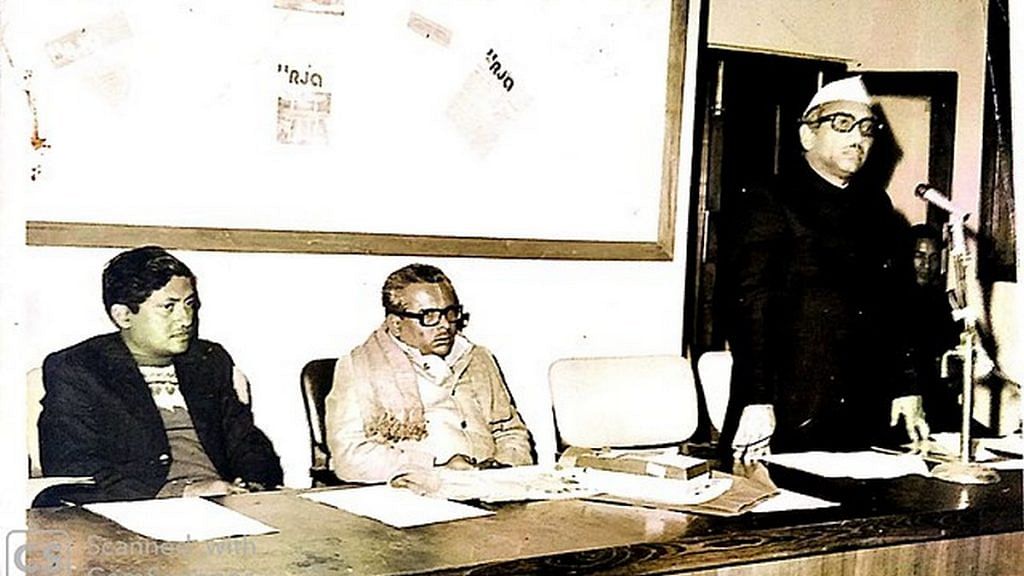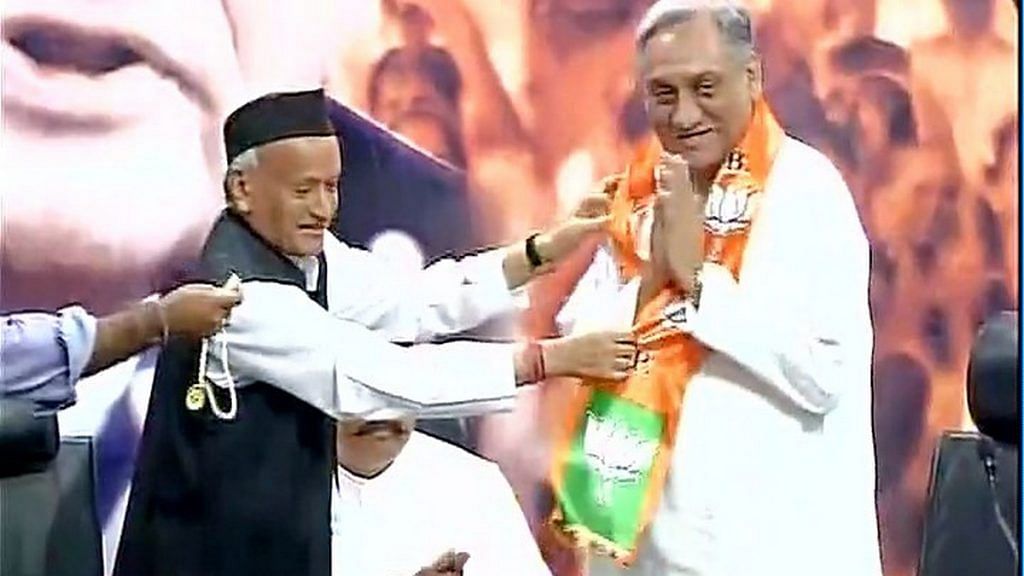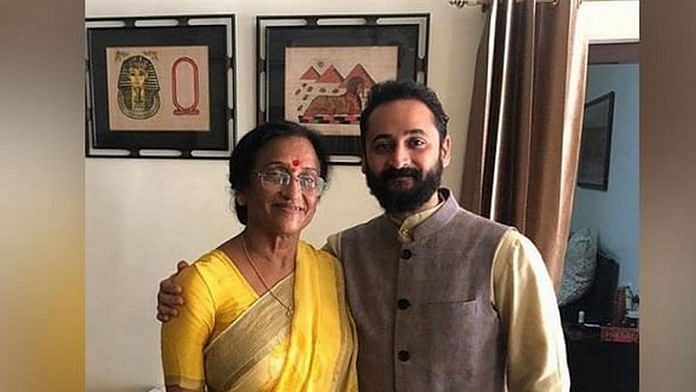New Delhi/Dehradun: Rita Bahuguna Joshi, Bharatiya Janata Party (BJP) MP from Allahabad, had a bitter pill to swallow just before the last phase of the Uttar Pradesh elections when her son, Mayank Joshi, joined the Samajwadi Party (SP).
The BJP had refused to grant him a ticket despite his mother’s offer to resign from her post to make way for Mayank to fight from Lucknow Cantonment, taking into account the party’s one-family-one-ticket rule.
However, Mayank Joshi’s switch-over should not come as a surprise — rebellion in the face of political sidelining, after all, has been something of a family tradition in the Bahuguna clan.
The late Hemwati Nandan Bahuguna, the family patriarch and eighth chief minister of Uttar Pradesh, was a staunch Congressman for decades until he switched sides to the Janata Dal in 1977. He returned to the Congress briefly but then quit again when he felt he wasn’t getting his due.
His son and daughter— former Uttarakhand chief minister Vijay Bahugana and Rita Bahuguna Joshi — also spent the bulk of their political careers in the Congress, but later moved over to the BJP.
However, unlike their father — who stayed a socialist till the end — the two Bahuguna siblings switched not just parties but also ideologies in their defections.
Also Read: H. N. Bahuguna, ‘Natwarlal’ who refused to take Indira Gandhi’s ‘son’ across Uttar Pradesh
The original maverick
Former freedom fighter H.N. Bahuguna, a native of Pauri Garhwal, made his name as a prominent Brahmin face of the Congress in Uttar Pradesh from the 1950s onwards.
He was first elected as an MLA in 1952 from the Karachana and Chail constituency in Allahabad, and won again in 1957 from Sirathu.
Indira Gandhi started out favouring him in 1967 when he stood by her side during then UP Chief Minister Charan Singh’s rebellion against her. In 1967, he got a berth in the finance and transport ministries, and two years later, he was elevated to the position of party general secretary.
In 1971, he won the Lok Sabha seat from Allahabad, but was so miffed with the junior minister post that he was given that he refused to take charge for 15 days; Indira Gandhi eventually gave him independent charge.
H.N. Bahuguna’s chance to return to UP politics came in 1973, when then CM Kamalapati Tripathi was forced to resign over a revolt by three battalions of the Provincial Armed Constabulary over pay and work conditions, in which at least 35 personnel were killed.

Bahuguna took oath as CM on 8 November 1973, four months before assembly polls were held in the state. The Congress won in March 1974 and he was sworn in again, but trouble was brewing on different fronts.
In his book An Indian Political Life: Charan Singh and Congress Politics, 1967 to 1987, Paul R. Brass describes how Kamalapati Tripathi tried to “undermine” H.N. Bahuguna, who nevertheless continued in his efforts to introduce “measures of benefit to the Harijans” and Muslims alike.
Indira Gandhi, however, had “little interest” in such issues as she “moved steadily towards total power”, Brass writes.
When she felt that Bahuguna was not toeing the line and was antagonising her coterie with his pro-poor land reforms and other measures that did not work for large business interests such as the Birlas and Hindalco, she and her son Sanjay Gandhi had him replaced as UP chief minister by N.D. Tiwari in 1975, Brass writes in his book.
This ‘disillusionment’ was a two-way street. Bahuguna, already riled that he had been informed suddenly about the Emergency “over breakfast” with no prior warning, was becoming increasingly tired of the Congress leadership.
In a BBC interview, he also spoke at length about how he felt increasingly disaffected with Indira Gandhi during his chief ministerial tenure.
“As soon as I took an oath for the CM’s position, I had a fight with Indira Gandhi on a foundational issue. She felt that I should consult her for every work. My stand was that ‘back seat driving’ was not possible. A CM who runs such a big state has to take his own decisions,” Bahuguna had said.
He also voiced his irritation at Indira Gandhi’s expectation that he should take her son Sanjay “across UP just like the CMs of Rajasthan and Maharashtra” and that he had refused to do so. “I told her that he should walk on his feet, work, move ahead, but this cannot happen on my shoulders.”
With this defiant attitude, Indira Gandhi had reason enough to sideline Bahuguna, but there were other factors at play, according to some Congress veterans.
Speaking to ThePrint, Shankar Chand Ramola, a senior Congress leader in Uttarakhand who says he worked closely with Bahuguna for two decades, said the personality clash was just the tip of the iceberg.
“The main cause of Indira Gandhi’s anger was Bahuguna’s support for [her detractor within the party] Chandra Shekhar in the 1974 Rajya Sabha elections, which he won. This was one of the main reasons for his removal as CM of Uttar Pradesh in 1975. Bahuguna also opposed the imposition of the Emergency by Indira Gandhi in writing,” Ramola said.
Bahuguna’s circuitous path from this period onwards earned him the title of the “Natwarlal (a legendary conman) of politics” from his detractors.
After leaving the CM’s post, he banded together with other Congress dissidents, including Jagjivan Ram, to float a new party called Congress for Democracy (CFD), which merged with the Janata Party in May 1977.
When the Janata Party formed the national government that year, he was made a Union minister, holding two portfolios — petroleum, chemicals & fertilisers and finance — until 1979. However, when the Janata government fell in 1979, he once again went back to the Congress and won the Garhwal seat on its ticket in the 1980 Lok Sabha elections.
This reunion was short-lived. Indira Gandhi did not give him a place in her cabinet and facing the prospect of being sidelined, he quit the party for the second time in 1982. That year, he fought again for Garhwal in a bypoll as an independent candidate and defeated his Congress opponent.
The beginning of the end for Bahuguna came in 1984 when he contested the Lok Sabha polls as a Lok Dal candidate from Allahabad, where he was pitted against film star Amitabh Bachchan, who the Congress had brought into the fray. Bahuguna lost badly. In 1989, he passed away due to heart disease, having never quite recovered his political strength.
However, his children decided to carry forward his legacy, albeit politically more than ideologically.
Like father, like son
As is often the case in India, politics became the family trade of the Bahugunas right from the 1970s.
To start with, H.N. Bahuguna’s second wife, Kamala, became a member of the Janata Party and won the 1977 Lok Sabha election from Phulpur in UP. That was the peak of her career, but her eldest son Vijay and daughter Rita entered politics for the long haul.
Vijay Bahuguna built up his credentials as a lawyer and then as a judge in the Allahabad and Bombay high courts, but in the 1990s, as the movement for a separate state of Uttarakhand picked up pace, he joined the Congress.

This he did in more ways than one. Like his father, he eventually became a chief minister (despite his lacklustre showing at the hustings initially), and, also like his father, ended up switching parties.
Vijay Bahuguna contested his first parliamentary election against his own cousin and former CM of Uttarakhand B.C. Khanduri from Pauri in 1998. He lost, as he did in the next two successive Lok Sabha polls from Tehri Garhwal in 1999 and 2004. His luck finally improved in 2007 when he won a by-election in Tehri Garhwal, and then again in the 2009 general election.
In 2012, Vijay Bahuguna became the sixth CM of Uttarakhand after the Congress won the state elections with just one more seat than the BJP. However, dogged by accusations of mishandling disaster relief efforts after the Uttarakhand floods in 2013, he was replaced by Harish Rawat as CM.
In 2016, he and eight other Congress MLAs defected to the BJP, leading to a major political crisis in the state.
In 2017, the BJP swept the state polls in Uttarakhand — Vijay Bahuguna did not contest but his younger son, Saurabh, did and won for the BJP from Sitarganj (from where his father had won in a 2012 by-election).
Vijay Bahuguna’s elder son, Saket, also tried his luck in politics when he was nominated as the Congress candidate from Tehri in the 2012 Lok Sabha by-election, after his father resigned from it. However, he was defeated by Mala Rajya Laxmi Shah, the daughter-in-law of the Tehri ‘royal’ family who has held on to the seat since then.
The daughter’s journey
Vijay Bahuguna’s younger sister, 67-year-old Rita Bahuguna Joshi, has also followed the family’s tradition of playing political hopscotch.
A former professor of mediaeval history at Allahabad University, Joshi started her career with the Samajwadi Party in 1985 when she won the mayoral election, but in the early 1990s, she too looked Congress-wards.
Joshi soon rose within the ranks of the Congress and served as the party’s Uttar Pradesh president from 2007 to 2012, but had no luck in the Lok Sabha elections in her two attempts as a Congress candidate.
In 2012, she won the Lucknow Cantt assembly seat, but switched to the BJP in 2016 after 24 years in the Congress, ostensibly because she was upset at the party’s stand against Prime Minister Narendra Modi’s surgical strikes in Pakistan-occupied Kashmir.
The Yogi Adityanath government in UP rewarded her with a ministerial berth in 2017, but she left her post to fight the Lok Sabha elections from Allahabad in 2019, and finally secured a victory.
Joshi — with her offer to resign her seat — clearly hoped that her son Mayank could enjoy a political ascent under the aegis of the BJP, with which he has been involved since at least 2009.
However, the party’s denying him a ticket for the 2022 state elections and his subsequent move to the Samajwadi Party and singing paeans to Akhilesh Yadav has, for now, upset the family applecart. But, for the Bahuguna dynasty, this is just par for the course.
Also Read: In UP’s Mau, gangster Mukhtar Ansari’s sport-shooter son is using ‘clean’ image to gun for votes



